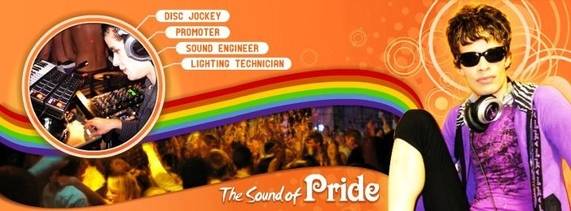
DJ Randall Ellison has called Champaign his home for most of his life. He was born in Madison, but grew up here and attended Centennial High School. After studying at the University of Illinois in Chicago, he returned and has been working and DJing in the Champaign-Urbana area for about 12 years. Randall is mainly known through his work as DJ SorceryKid and through Nekromancy, his Monday night audio/visual mixshow of dark, alternative, industrial, and goth music.
Tonight, Ellison will co-host the Fifth Annual Gothic Prom at Chester Street Bar. He spoke with Smile Politely about DJing for both the Gothic and LGBT communities, and about the history of C-U’s only alternative formal.
Smile Politely: How did you get into DJing? How did it all start?
Randall Ellison: Listening to internet radio stations, back when they were just starting out. People didn’t even know what internet radio was and I was listening to all of this music. And I thought that it would be so great if I could select the music because there were so many unknown bands that needed exposure — so many great artists that you just don’t hear about. They had a great sound that would fit in, but they didn’t have the opportunity because they’re not on top-40 radio. They don’t have that kind of pull.
At that time, I was working with a small business, and I didn’t have time to focus on it. But then, some of my friends were talking about going out to clubs and I thought, “What’s a club?” I’d never been to a club, so I was interested. Actually, my first date was at Chester Street Bar. And after that experience … some 400 people were there; it was packed, and you had to wait in line for 10 minutes just to get in the door, and then it took another 15 minutes just to get yourself out on the dance floor area. I loved the speakers and the loud music and the lights … I was hooked. After that, I said, “Radio? What’s radio?” I wanted to be the person who was up in that booth. It was so exciting. I was addicted. Literally, I started going out every week. That was also when I discovered the Industrial/Goth club nights. I didn’t know that there were actually clubs for that. That was in the heyday of the Goth scene, the late 90s. They featured a mix of industrial, electronica, trance, things like that.
I saw this opportunity to step in and gain some experience and learn how to run a club night. At that time there was a second community at Mike ‘N Molly’s, and that’s how I got my foot in the door — helping out the co-DJ that night with a bunch of other scene people.
SP: And they’re the ones who trained you?
Ellison: Yes, that’s where I got the experience. I didn’t know anything about DJing at that time. There were some promoters that were veterans and they gave me a lot of experience and introduced me to the key people to talk to. I got experience working with bands and helping to put on shows. It’s been a continual learning experience.
SP: What are your influences, locally or nationally? Who are your heroes?
Ellison: That’s a difficult question. Just talking about DJs, there are probably three principal DJs that influenced me, and I have to give credit where credit is due. One of them is DJ Bob Murphy. If it wasn’t for him, the Goth scene wouldn’t have been anything like it was. He had the vision and the foresight to see where it could go. That’s always given me a lot of incentive to think the same way. Even if people say I can’t do something, I still do it anyway.
DJ Michael Limacher. He’s probably one of the longest-running DJs in the city, and I don’t think he’s ever gotten enough credit. He lives in Bloomington now. He’s no longer DJing at Chester Street, but he used to be the resident DJ on Saturday nights. He began DJing there when they opened in ’85.
The third DJ who’s influenced me is Moby. I give him full credit as being the one who first opened my eyes to what a DJ does. I bought his double album at Periscope Records, Everything Is Wrong, where he took up DJing and remixed all of his classic anthems. I was so impressed by that. My learning of the artistic aspect of DJing came from him.
SP: You’re a resident DJ in a couple of places in Champaign. Can you talk about these regular gigs?
Ellison: Originally, years ago, I’d drawn up a business plan to open an all-ages club, 16-plus, non-alcoholic. I tested the concept at Channing-Murray Foundation. It was a monthly thing at that time, a few bands, just a test. But it didn’t really go anywhere, so I put that on hold for a while.
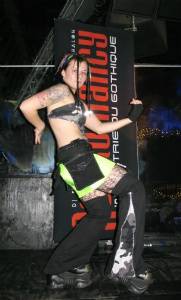 Then I got hired at Chester Street as a resident DJ, so I began applying my talents there and focusing on promotion and production aspects as an independent music production DJ service. I still do sound engineering and I have a mobile DJ business. But when I started doing Monday nights at Chester Street too, I decided to start a separate service to focus just on that aspect, and that’s when two of my colleagues and I formed IDG Productions. It started out as being a production aspect of Nekromancy, but it expanded throughout the years to co-sponsor various events both in Bloomington and here. Probably our biggest production is Funker Vogt, a German industrial band that tours the U.S. It was phenomenal to bring them here and have them perform at a venue like Chester Street.
Then I got hired at Chester Street as a resident DJ, so I began applying my talents there and focusing on promotion and production aspects as an independent music production DJ service. I still do sound engineering and I have a mobile DJ business. But when I started doing Monday nights at Chester Street too, I decided to start a separate service to focus just on that aspect, and that’s when two of my colleagues and I formed IDG Productions. It started out as being a production aspect of Nekromancy, but it expanded throughout the years to co-sponsor various events both in Bloomington and here. Probably our biggest production is Funker Vogt, a German industrial band that tours the U.S. It was phenomenal to bring them here and have them perform at a venue like Chester Street.
IDG stands for Industrie du Gothique, “Industry of the Goth.” Nekromancy is the event itself and IDG is the production company behind it. And I’m the executive producer. Alexander Klec and Andy Cardinal are producers.
SP: And you’ve been hosting Boys Night Out at Boltini Lounge for a long time, haven’t you?
Ellison: Wednesdays at Boltini Lounge were originally “Boys Night Out” and I still characterize it that way. I’m still hoping to develop it into something, but there’s a lot of struggling in downtown overall, trying to maintain resident DJ nights. I feel very fortunate that Boltini maintains a Wednesday night — the middle of the week — that’s an LGBT night. I think that says a lot about our community, the support that we have.
SP: Is there any danger of Boys Night Out going away?
Ellison: There’s a lot on my plate, but I’m hoping to bring in some other talent to supplement it. That will help to bring in more people. But it comes down to a budget. Mondays at Chester are difficult too. It’s hard to keep a weekly night going long term. They aren’t always economically viable. I’m looking at building something up. A re-imagining of the night is going to be the key, I think.
SP: What kind of music do you play at Boltini? It’s not Goth/Industrial, right?
Ellison: No, and the people at Boltini find it amazing that I do a Goth/Industrial night and the people at Chester find it equally amazing that I do a mainstream night at Boltini. But I’m very diverse and I appreciate a wide variety of music: new age, top 40, commercial dance, industrial, synth pop, jazz fusion. I’m all over the map. I love all types of music and it’s a benefit to me.
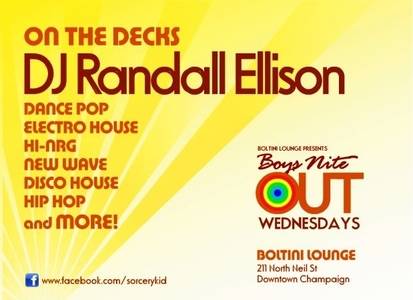
But the evolution of the scene … back in the day it used to be that the DJ selected the music the crowd would listen to, and that’s what the night developed around. But it’s changed a lot with the expectations of the customer. The customer drives the music.
SP: Then why have a DJ at all?
Ellison: I know. A lot of venues have gone the way of jukeboxes and I’m really struggling to try and maintain the art form.
SP: Why do people always gravitate to the simplistic?
Ellison: There’s a radical distinction between the European and Australian music scenes and the American music scene. They’re still very much in the old school aspect of where the DJ is the driving artistic force. I try to combine those two aspects. I know I have to serve the consumer, but at the same time I still try and add an artistic aspect. That’s one of the reasons I hold so firmly to the ideal that I’m never going to be a laptop DJ. I don’t have anything against laptop DJs, but I feel that once you’ve taken that one additional step, that you’ve lost so much. So I think the best I can do is still hold on to that historic notion of what a DJ is, to still at least do the one element that people still recognize, and that’s where you’re really doing something visually appealing. And they can see what you’re doing. I’m not just sitting there looking at a screen.
SP: And it must pay off. You work all the time.
Ellison: Outside of DJing, most of my skills are focused on my mobile DJ business. There aren’t a lot of gigs, and I’m hoping to promote more because I have an enthusiasm for the technical aspects, the sound engineering and the lighting engineering. I’m very technically oriented like that, even anal retentive to a degree [laughs]. I love a really good club sound; I love a really good, appealing light show — all of those elements coming together. You can always tell when you have somebody who comes in and sets up a lighting and sound show. That’s the other aspect of DJing that I have the most love for.
SP: Which is where the Gothic Prom comes in. Tell us its history.
Ellison: It didn’t occur to me to do something like this until we started promoting the annual White Party. It got me thinking, and it’s kind of a neat distinction. The Goth Party is the opposite of the White Party; essentially, it’s a Black Party.
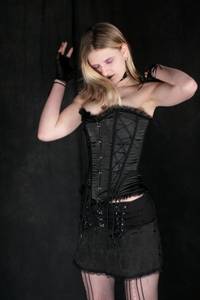 It originally started in 2008, when we’d just launched Nekromancy. It was intended to be a one-off. We were considering doing a prom night. And we thought, why don’t we make it distinct from Nekromancy and make it a community-sponsored event, and get everyone involved and make it something of their own that they can take credit for. So, it was very much spur of the moment, although everything came together amazingly, and everyone loved it and it was our biggest night at that time. So, I thought why not just make this a recurring event every year and develop it into a theme.
It originally started in 2008, when we’d just launched Nekromancy. It was intended to be a one-off. We were considering doing a prom night. And we thought, why don’t we make it distinct from Nekromancy and make it a community-sponsored event, and get everyone involved and make it something of their own that they can take credit for. So, it was very much spur of the moment, although everything came together amazingly, and everyone loved it and it was our biggest night at that time. So, I thought why not just make this a recurring event every year and develop it into a theme.
This year, the theme is The Brass Ball. But in every previous incarnation we’ve had different themes, and each year it’s attracted a more and more diverse group of people, as well. That’s why, even though I like calling it a “Gothic Prom,” it really isn’t anymore because there are so many different people, so many different lifestyles that come out that I think the Gothic Prom is now a legacy name that we’ve maintained because it’s recognizable. But in reality, it’s held at a gay friendly venue and we get such a diverse crowd of people. It’s open to anybody, regardless of sexual orientation, gender identity, lifestyle, music interest, whatever.
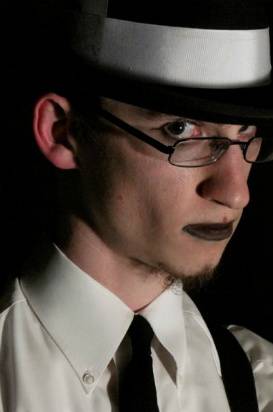
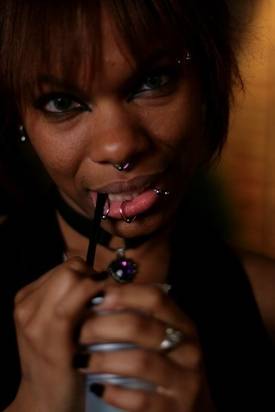
Above photos by Scott Weber
Most of the crowd that comes out are of the Goth/Industrial persuasion, but in the end there are a lot of people who stop in because they have friends there and they love the atmosphere. It’s open and accepting; it’s a formal for the alternative — people who didn’t fit in during high school, especially those in our surrounding cities who couldn’t come out as themselves.
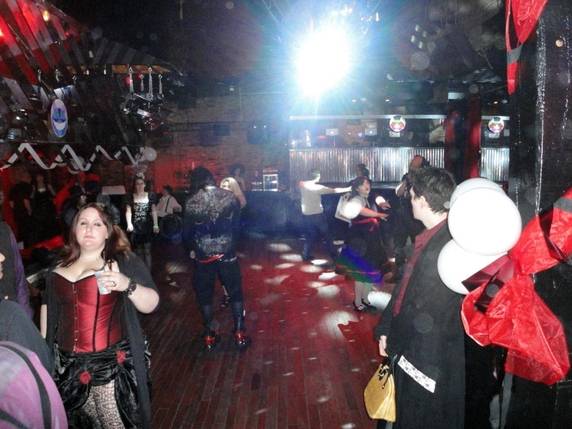
Above and below photos by Benjamin Stone
Officially it’s called Gothic Prom 2012: The Brass Ball, but in reality it’s Champaign-Urbana’s alternative formal.
SP: So what can people expect on Monday?
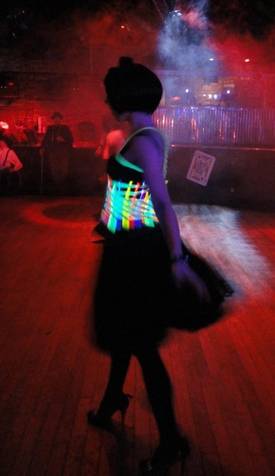 Ellison: It’s pretty exciting. We’ve got two DJs from Chicago lined up: DJ Scary Lady Sarah and William Faith. Scary Lady Sarah is well known because she’s run the longest running Goth night in the world: Nocturna. She has a great deal of influence in the Goth scene.
Ellison: It’s pretty exciting. We’ve got two DJs from Chicago lined up: DJ Scary Lady Sarah and William Faith. Scary Lady Sarah is well known because she’s run the longest running Goth night in the world: Nocturna. She has a great deal of influence in the Goth scene.
Willian Faith is a founding member of Faith and the Muse and he’s also been in a few other Industrial bands, Christian Death being just one. Both of their backgrounds are Goth, obviously.
Our decorations are phenomenal, much of it in the steampunk theme, and we have games planned. Everything is themed, even the food. We also have photographers lined up. Our MC is Gregory Kveberg, and he’ll be presiding over the ceremony this year and will crown the Duke and Duchess. He’s a native of Champaign and he’s really old school when it comes to the Goth scene. He’s a perfect fit. It’s because of him that we’re probably going to have one of our largest reunions at this prom. It’s an informal reunion of sorts; we’ll be getting a lot of old school people from the Goth/Industrial scene. Some haven’t been back for ten years. There are a lot of people coming from Chicago, and who’ve moved on to various parts of the country.
I’m so impressed with the cohesiveness of the scene, that we’re able to work together to make this happen. We’re really fortunate that in a community this size, we’re able to pull something like this off every year. We really work it out, as far as the numbers and the pull that we have, the draw we get.
SP: I didn’t know that this was put together by the community. I thought this was your thing.
Ellison: I’m a co-sponsor and co-producer of it. IDG Productions is one of the producers and the other is C-U Midnight Assembly. But the community is the major driving force for the prom. I oversee things, but in the end I just sort of sit back and let people do what they want to do. That’s the joy of it. It’s phenomenal what they’re able to put together on such a limited budget.
The prom is the one event where everybody comes out and they’re themselves and enjoy themselves. No drama, nothing. We all pull together as a community.
~~*~~
Gothic Prom V: The Brass Ball happens tonight at Chester Street Bar at 9:00 p.m.
Dress: Anything and everything; all are welcome
Cover: $5
Age: 19+
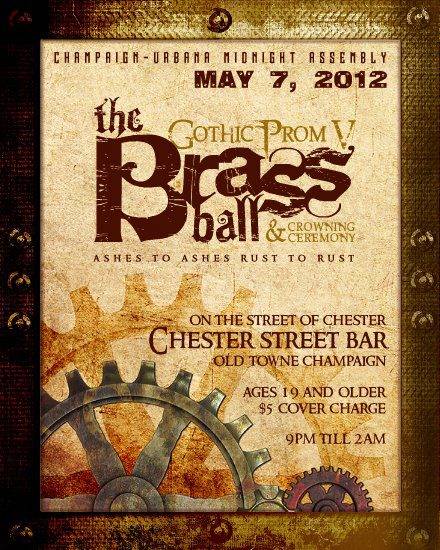
All photos used with permission.








